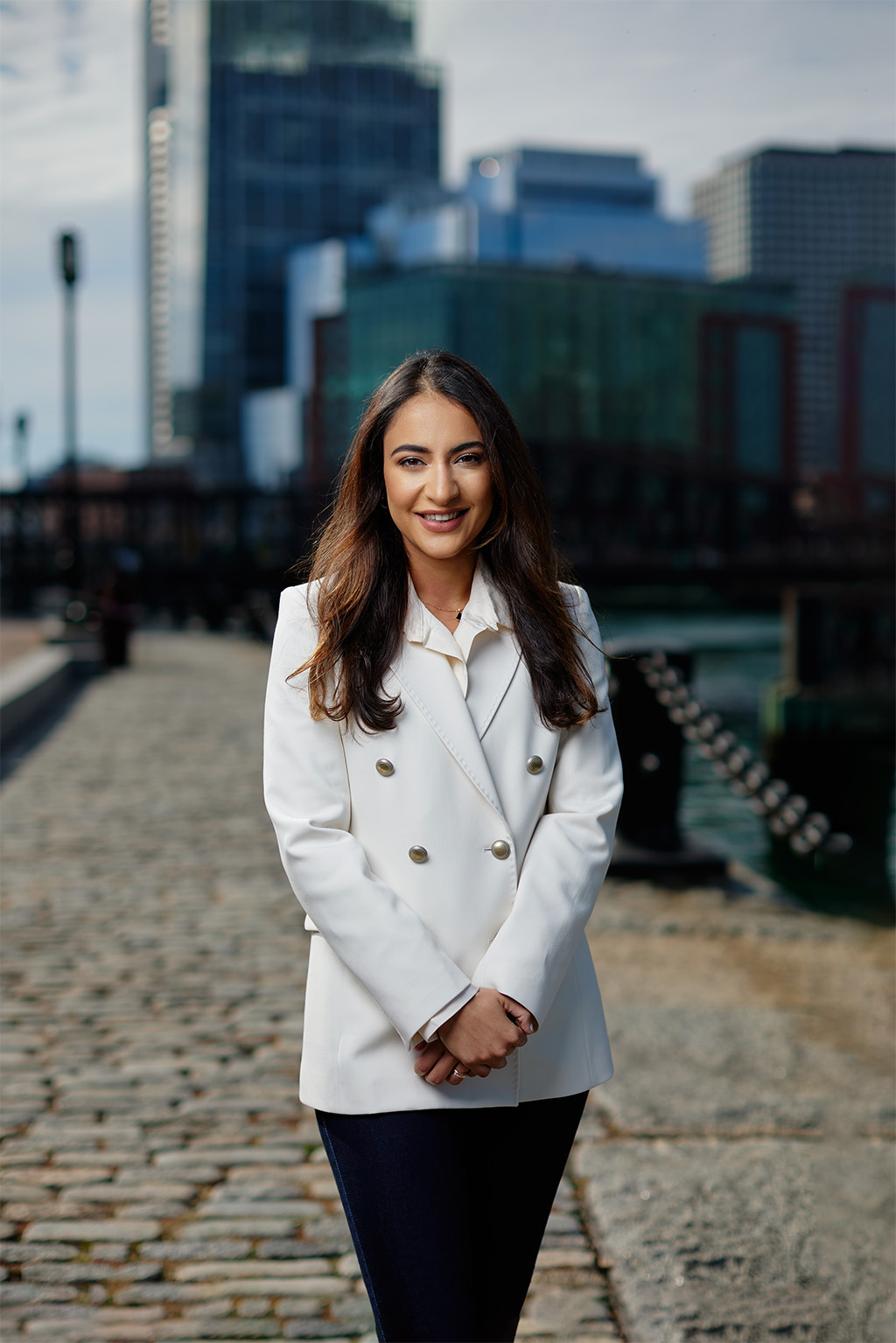Shaikhah Alshuaib moved to Boston when she was 17 to earn a bachelor’s degree from Boston University. She had a scholarship from Kuwait’s Ministry of Education and planned to pursue a pre-med track and then a career in dentistry. But she soon fell in love with research, working in a lab, and trying to understand the most complex inner workings of the human brain.
عن ذلك قالت: “انجذبت حقًا لتعلم المزيد عن البحث العلمي”. وبمساعدة من المرشدين والمستشارين العلميين، غيرت الشعيب دراستها الجامعية إلى البيولوجيا العصبية حتى تتمكن من التخصص في مجال أبحاث علم الأعصاب. وأوضحت: “أحببتُ علم الأعصاب، وأدركتُ أنني ينبغي أن أدرس شيئًا أشعر بالشغف حياله”.
Now, she is working on a neuroimaging-based Ph.D. research project with significant implications for the future of medicine and our understanding of the human brain.
وقالت إنها قبل انتقالها إلى بوسطن، لم تكن تعرف سوى القليل نسبيًا عن التخصص المهني في مجال الأبحاث، ولم تكن تحلم بنيل درجة الدكتوراه في علم الأعصاب. وأضافت: “في الكويت، في بعض الأحيان، أشعر أن ثقافة المجتمع لا تحتضن العلماء ولا تحفل بأهمية ما نفعله”. لذا يصعب على شباب الكويت اكتشاف المسارات المهنية في العلوم واستكشافها: “كانت تلك العقبة الكبرى في رأيي… فلو توفرت لي إمكانية الوصول إلى المختبرات والأبحاث والعلماء الذين يمكنني أن أتعلم منهم لكنت فعلت ذلك في مرحلة أبكر بكثير من مسيرتي الدراسية”.
وتمـتـاز بـوسطـن في ولاية نيـوإنغلاند الأمريكية تاريخيًا بأنها مهد للابتكار العلمي، ولاسيما لعلم الأعصاب. وعن ذلك قالت الشعيب: “إنها المدينة الأمريكية التي وُلد فيها علم الأعصاب، وحيث أجريت التجارب الأولى في هذا المجال”.
عاش عدد كـبير من عـلماء الأعـصاب المشهورين، بمن فيهم ستيفن دبليو. كوفلر Stephen W. Kuffler، الذي يُـعرف باسم “أبو علم الأعصاب الحديث”، وأجروا تجارب متقدمة جدًا في مختبرات جامعاتها مثل جامعة هارفارد Harvard University وجامعة بوسطن. وساعد ما خلفوه من إرث علمي على ضمان بقاء المدينة مركزًا لأبحاث علم الأعصاب حاليا. قالت الشعيب: “لذا كان من السهل أن أرى ما هو علم الأعصاب من منطلق الأبحاث النظرية، وكان المختبر متاحًا للعمل فيه، وكانت ثقافة الوسط مشجعة”.
This culture allowed her to undertake a series of internships in various environments while she studied for her B.A. in biology with a specialization in neurobiology and then an M.A. in neurobiology, which she completed in 2019. One of her first neuroscience internships was in a clinical research environment at the Vision and Cognition Lab at Boston University, working with patients with Parkinson’s Disease, a progressive disorder that affects the nervous system.
But Alshuaib soon found that she enjoyed working in a wet lab more than working with patients in a clinical setting. A wet lab is a lab equipped with plumbing, ventilation, and equipment that allows for hands-on scientific research and experimentation, like the Membrane Biophysics Lab at Boston University, where Alshuaib now works. She said she prefers the wet lab environment because it allows for greater experimentation with fewer ethical considerations. Whereas in a clinical setting, she worked with living patients, Alshuaib now works with samples of various animal brains in the lab.
Her current Ph.D. project involves testing ultrasound technology on various animal models to understand how ultrasound affects neurons and the neural membrane and how neurons communicate with one another. The project was made possible, in part, thanks to funding from the Kuwait Foundation for the Advancement of Sciences (KFAS).
When she decided she wanted to continue her research beyond the completion of her M.A., funding was a significant concern. She applied for funding from KFAS in Spring 2020 and was selected for a grant.
وأضافت الشعيب أنها أمضت هي والمشرفان عليها، الدكتور جن – وي لين Jen –wei Lin من جامعة بوسطن والدكتور يوشيو أوكادا Yoshio Okada من كـليـة الــطـب بـجـامـعة هارفارد، الفترة الانتقالية في “حل المشكلات وتجميع القطع معًا”. لقد تعلمت الكثير خلال هذه الفترة. وبدا أن العالم يتباطأ بسبب عمليات الإغلاق التي فرضتها مكافحة جائحة كوفيد، لكن ظلت الشعيب قادرة على الوصول إلى المختبر والتواصل على نحو غير مسبوق مع المشرفَيْن عليها اللذين كانا أقل انشغالًا من المعتاد. قالت: “لقد تعلمت أشياء لم أكن أعتقد أنني سأتعلمها”.
In September 2020, when the news came that KFAS would help fund their project, the team was ready to secure the final materials and equipment they needed to carry out their experiments and start collecting data right away.
With the final round of experiments almost complete, Alshuaib is now looking ahead to writing and publishing her results over the next two years. She anticipates having a first publication released sometime next summer. As she begins to compile her results and reflects on the project, Alshuaib is thankful for the recognition and support provided by KFAS.
وقالت: “كان مستوى حرية البحث الذي توفر لنا بفضل التمويل مدهشًا. لقد تعلمت الكثير خلال العامين الماضيين”.
By Marianne Dhenin
